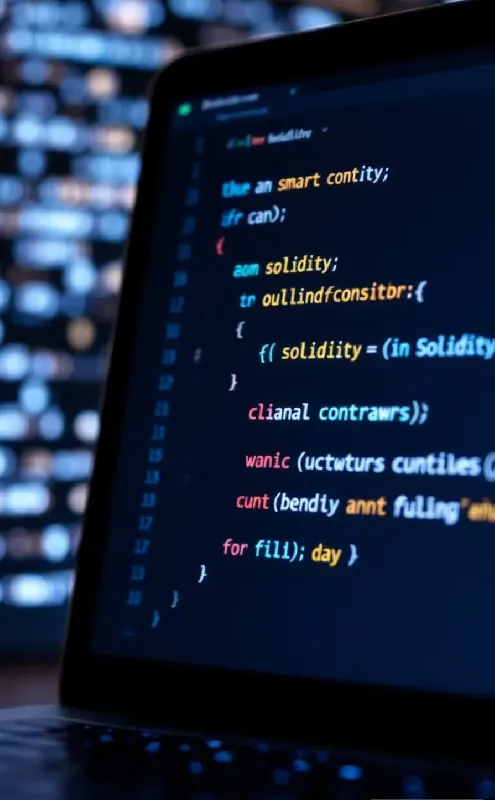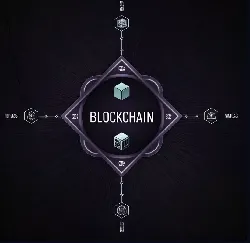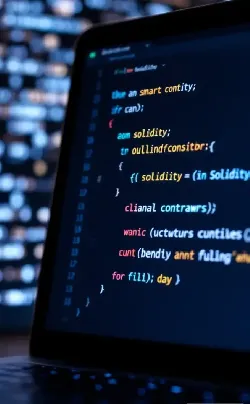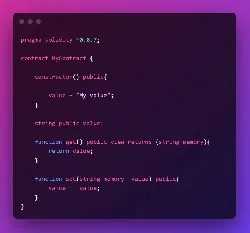What is a Smart Contract?

A smart contract is a self-executing digital agreement that lives on a blockchain. Once the contract’s pre-defined conditions are met, it automatically carries out the agreed-upon actions,no middlemen, no manual effort. These contracts are widely used to automate transactions and ensure that all parties involved get reliable outcomes without needing to trust a third party.
In addition to automating agreements, smart contracts can also trigger specific workflows, initiating the next step in a process the moment set criteria are satisfied. The logic behind these contracts is written in specialized programming languages tailored for blockchain platforms,Solidity being one of the most common.
Smart contracts act as the foundation for many decentralized applications (dApps), allowing users, services, or even organizations to interact transparently and efficiently by enforcing roles and responsibilities through code.
Why Are Smart Contracts Important?
Smart contracts are not just technical novelties,they offer real-world value across various industries. Here’s why they’re essential:
-
Automation: Once the coded conditions are met, the contract executes itself. No need for human supervision or manual intervention.
-
Cost Reduction: By cutting out intermediaries such as brokers, lawyers, or banks, smart contracts eliminate associated fees and simplify processes.
-
Speed and Accuracy: They reduce time-consuming paperwork and human errors, ensuring agreements are carried out precisely as written.
-
Transparency: All transaction records are visible on the blockchain and accessible to authorized parties, making data verifiable and tamper-proof.
How Do Smart Contracts Work?
Smart contracts operate based on basic conditional logic,typically framed as “if/when this happens, then do that.” These rules are coded directly onto the blockchain. Once the network confirms that the conditions have been fulfilled, the contract automatically executes its function.
Just like a traditional contract, a smart contract binds parties to an agreement. However, it leverages blockchain technology to deliver efficiency, trust, and automation without needing a central authority.
Working Process of a Smart Contract:
1. Agreement Between Parties
All involved parties define and agree on the terms and conditions of the contract,what triggers it and what it should do once triggered.
2. Contract Creation
-
The contract can be coded directly by developers.
-
Alternatively, parties may collaborate with a smart contract service provider.
-
The terms are written in a programming language like Solidity, designed for platforms like Ethereum.
-
Security auditing is critical at this stage to avoid exploitable bugs or logic errors.
3. Deployment on the Blockchain
-
The contract code is uploaded to the blockchain just like a cryptocurrency transaction.
-
Once the network validates the transaction, the contract is permanently deployed and cannot be altered or reversed.
4. Condition Monitoring
-
The smart contract itself (or an external oracle) monitors real-world events or on-chain data to determine when its conditions are met.
5. Execution of Contract
-
Once the criteria are fulfilled, the contract automatically performs the specified action,such as releasing payment, transferring ownership, or updating a record.
6. Recording and Confirmation
-
The result is logged on the blockchain in real-time.
-
The network then confirms the transaction, ensuring that the outcome is final, secure, and publicly verifiable.
Advantages of Smart Contracts
Smart contracts deliver a range of benefits that go beyond simple automation. Here’s a breakdown:
✅ Speed, Efficiency, and Accuracy
-
Execution is instant when conditions are satisfied,no waiting for approval or manual processing.
-
Eliminates the risk of human error and delays typically associated with paperwork.
✅ Trust and Transparency
-
Because they operate on a blockchain, there's no need for middlemen.
-
Every transaction is cryptographically secured and shared across the network.
-
Information is immutable and cannot be manipulated by either party.
✅ Security
-
Transactions are encrypted and stored across a decentralized network.
-
Each contract record is linked to the previous one, making it extremely difficult to tamper with or reverse.
-
This layered cryptographic structure provides built-in integrity and auditability.
✅ Cost Savings
-
Smart contracts eliminate the need for intermediaries who would otherwise charge fees for handling the agreement.
-
By automating processes, they also reduce administrative overhead and delay-related costs.
Real-World Applications of Smart Contracts Across Industries
As blockchain adoption accelerates, smart contracts are quickly becoming the backbone of automation across sectors. With an expected compound annual growth rate (CAGR) of over 82% between 2023 and 2030, smart contracts are reshaping how agreements are executed,without the need for middlemen. From finance to entertainment, their ability to enforce terms transparently and autonomously is gaining serious traction.
1. Finance: DeFi and Cross-Border Transactions
The financial sector was one of the first to embrace smart contracts,especially in decentralized finance (DeFi). These programmable contracts automate everything from identity verification to cross-border payments, drastically reducing paperwork and processing delays.
Real-World Example:
We.trade, powered by IBM Blockchain, provides a secure platform for cross-border trade finance. Smart contracts in this system automatically execute payment and shipment conditions, eliminating counterparty risk and enhancing transaction transparency.2. Gaming and NFTs
Smart contracts are transforming gaming economies and NFT ecosystems by enabling true digital ownership. Players can securely trade in-game assets, transfer characters, and earn real-world value,all without relying on centralized game developers.
Real-World Example:
Cyber8, in collaboration with Synodus, built a sports metaverse using NFTs. Players earn tokens through gameplay (“Play-to-Earn”), all managed through smart contracts that automate deposits, purchases, and rewards.3. Healthcare: Secure Patient Data and Billing
Healthcare providers use smart contracts to securely store encrypted medical records and manage sensitive billing workflows. Only authorized personnel can access patient data, and smart contracts also help reduce fraud by tracking pharmaceutical supply chains from factory to pharmacy.
Real-World Example:
Encrypgen uses smart contracts to facilitate DNA data sharing for research. Patients retain control over their genomic data while researchers can request access, make payments, and receive permission,all through blockchain-based contracts.4. Real Estate: Streamlining Ownership and Licensing
Real estate transactions are notoriously slow and paperwork-heavy. Smart contracts help digitize and automate property records, title transfers, and licensing,cutting out middlemen and lowering costs.
Real-World Example:
Smart contracts have been used to tokenize property ownership, allowing fractional investment and transparent mortgage processing,making real estate more accessible and less bureaucratic.5. Supply Chain and Logistics
In supply chain management, smart contracts offer real-time tracking, accountability, and reduced fraud. Every product movement is logged immutably, allowing managers to trace delays, prevent theft, and authenticate the origin of goods.
6. Retail and E-Commerce
Retailers are using smart contracts to automate vendor agreements, customer refunds, and loyalty programs. These contracts improve transaction speed and ensure fair dispute resolution.
-
Automate vendor payments and returns
-
Define clear refund policies in the contract
-
Allocate loyalty rewards based on real purchase history
-
7. Entertainment and Media
Artists, musicians, and content creators benefit from smart contracts by bypassing intermediaries and ensuring timely royalties.
Real-World Example:
Choon, a blockchain-based music streaming platform, uses smart contracts to boost artist revenues,reportedly increasing earnings by up to 80%.Fans can also make cryptocurrency payments, enabling direct-to-artist engagement while maintaining IP rights.
8. Human Resources and Payroll
HR departments leverage smart contracts for:
-
Automated payroll based on working hours or performance
-
Transparent hiring processes
-
Validation of employee credentials and training histories
-
These features reduce administrative burden and increase fairness in performance evaluations and compensation.
9. Voting Systems
Blockchain-based voting systems offer transparency, security, and tamper-proof results. Voters are verified through private keys, and each vote is immutably recorded on-chain.
While still emerging, smart contract-based voting could transform elections by increasing participation and reducing fraud.
10. Digital Identity and Access Control
Smart contracts empower users to manage their digital identities, enabling them to control who accesses their data and when.
-
KYC verification: Automated and secure
-
Data control: Fully user-driven
-
Auditability: Every access is recorded on the blockchain
-
AI for predictive logic: Machine learning can suggest or enforce contract outcomes.
-
Blockchain for audit trails: Keeps AI decisions transparent and tamper-proof.
-
Smart contracts powered by AI will drive the next wave of automation in industries like insurance, manufacturing, and legal tech,enabling more adaptive and data-driven workflows.
11. Decentralized Autonomous Organizations (DAOs)
DAOs are blockchain-native organizations governed entirely by code. Members vote on proposals, budgets, and strategies through smart contracts, removing the need for traditional management structures.
Example:
VitaDAO funds scientific research through community governance, allowing token holders to vote on which projects receive funding—directly coded into smart contracts.12. The Future: Smart Contracts + Artificial Intelligence (AI)
The synergy between AI and smart contracts opens up powerful new possibilities. AI brings intelligence to contract decision-making, while blockchain ensures execution is transparent and immutable.
-
AI for predictive logic: Machine learning can suggest or enforce contract outcomes.
-
Blockchain for audit trails: Keeps AI decisions transparent and tamper-proof.
-
If you're looking to build on this technology, now is the time to explore its practical use cases and find partners who can help you turn smart contracts into smart solutions.
Smart contracts powered by AI will drive the next wave of automation in industries like insurance, manufacturing, and legal tech,enabling more adaptive and data-driven workflows.
Final Thoughts
From automating payments and securing medical data to managing digital identities and voting systems, smart contracts are unlocking a new era of trustless automation. Their applications stretch far beyond finance, offering real-world impact across nearly every sector. And as AI and blockchain continue to converge, expect smart contracts to get smarter,redefining how agreements are formed, enforced, and evolved.
-
If you're looking to build on this technology, now is the time to explore its practical use cases and find partners who can help you turn smart contracts into smart solutions.
Our Solution
Sources





